UNIT 1: MYSELF AND MY COMMUNITY
Key unit competence: To use language learnt in the context of myself
and my communityINTRODUCTORY ACTIVITY
1. Describe what you see in fig 1 and tell what this represents for the
country.
2. Identify different activities which are being done in fig 2, and fig 3.
3. What do you understand by the term community?
4. As a community member what role would you like to play in order to
contribute to the development of your community? Describe such a
role.
5. Is community work important? Explain.
6. What would you advise a person who doesn’t take part in communitywork?
1.1 Describing my community
1.1.1. LEARNING ACTIVITReading and text analysis
Text: Visit to a village
My father was born and brought up here. When at the age of 19 he joined the
army, he left his home. Since then he only occasionally visited the village. This
time we had gone there after five long years. But surprisingly, very little has
changed in my village during those five years.
My village is backward. Despite great progress in other parts of the country, the
pace of development is very slow in my village. My village is connected to the
main road by non- metallic road. When I entered the village, I was welcomed by
lush green fields. There were hills and hillocks scattered all around the village.
The farmers were sowing the seeds in their fields. Their wives and children
were also helping them. At a little distance there was a big field. A flock of
children were grazing their cattle there. A stream was flowing nearby. The
grazing cattle were drinking water in the stream. The greenery that I saw in
the village is rare in a city. The life is laid back and calm. There is no hassle and
moving there. Moving ahead, suddenly some stinking smell struck my nose. I
covered my nose with my handkerchief. The smell was coming out of a big drainwhich was flowing nearby. The muddy passage was littered by the cow dung.
In the village I saw the primary school. I was surprised at the sight of school.
It merely consisted of a two-room building. There were around thirty children
sitting on coir mat. There were two teachers, each one teaching a group of
fifteen, twenty children. The children were writing on the wooden plates called
tektites. There was dullness and silence all around. I could hear no noise except
the scream of children and the barking of dogs. However, there was occasionalhoarse crying of vendors that one can hear in the village.
There were no shops, hospitals, cinema halls, post offices, banks in the village.
People have to move two kilometers to buy things of day-to-day need. Due to
lack of hospitals, sometimes the villagers have to meet untimely death. They
cannot get immediate emergency treatment there. There is no cinema hall. It is
only through the cable network that they can see a movie otherwise they have
to travel six kilometers to have a show of movie. Power cut is an importantfeature of my village.
I stayed for two days in our village; the second day was very boring. So long
I was among the relatives, I felt good. I returned to my city the third day. But
while returning I took a resolve to work for the improvement in the life of thevillagers, as I grow up.
Adapted from: http://www.shareyouressays.com/persuasive-essays
/487-words-short essay-on-a-visit-to-a-village/48
Comprehension questions
1. What would you say about the development of that village?
2. Describe the home village of the writer as discussed in the passage.
3. Do you think the environment was pleasant to the writer? Explain.
4. According to the writer, how would you explain the challenges peoplemay face in that village?
1.1.2 APPLICATION ACTIVITY
Vocabulary, sentence and essay writing
1. Using dictionaries and thesaurus, find the meaning of thefollowing words:

Everybody is unique in their own way and so am I. I feel that what has had the
most impact on who I am today is being brought up in a God-fearing family.
Throughout my childhood till now, I have heavily relied on my family for support
in whatever decisions I make myself. My culture is based on three essential
tenets: good thoughts, good deeds, and good words. In line with these tenets,
I always try to do good things to other people and do my best in my own life
endeavors in order to achieve the best of results. I particularly try to do well in
my academics since I saw right from my childhood the many opportunities anddoors one can access through good education.
Even though I am not very intelligent or highly talented, I am a very
hardworking person. In high school, I used to be among the last in memorizing
and understanding texts. While some students only needed to be taught the
basics of lessons in order to start understanding the concepts, it took me a lot
of time to understand them. This did not however bar me from always claiming
the first position in class and even winning the “Best Student of the Year” prize
on many occasions. Out of my spirit of hard work, I would sit down with my
books after class and carefully study all the concepts that I found challenging tounderstand. Moreover, I would seek teachers’ help as much as I would need it.
My humble attitude in relating with others has enabled me to earn respect
from everyone I interact with. In addition, I never lose hope no matter how
physically or mentally poor a situation might make me to be. Instead, I normally
make efforts to achieve my dreams by utilizing my strengths and accepting myweaknesses but never giving them a chance to bring me down.
Finally, I am blessed with a spirit that is sensitive and jumps into action
whenever there is need to stand up for righteousness, especially that involving
people. I am also hospitable to people regardless of where they come from
because I believe that guests bring good fortunes and the best thing to do is
to welcome them warmly. I may only turn hostile if the intention of the guest’s
visit is to harm me because even the Holy Bible teaches us to defend ourselvesfrom unjust aggression.
Adapted from: https://gudwriter.com/what-makes-you-unique-essay-example/
Comprehension questions
1. Explain the writer’s source of support in his or her life.
2. Examine what makes the writer unique among other people as expressed
in the passage.
3. Referring to the text, why do you think the writer could not get easily
discouraged in his/her life?
4. After reading this text, which lesson can someone learn from him/her asfar as people’s relationships in community are concerned?
1.2.2 APPLICATION ACTIVITY

1.3 Talking about community daily activities
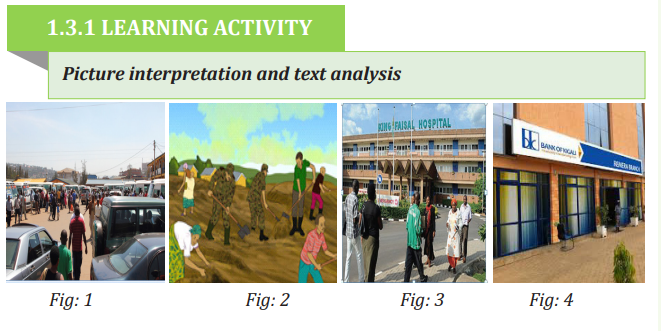
A. Picture interpretation
While interpreting the above pictures, respond to the following questions:
a. Describe what is taking place in fig 1 up to fig 4.
b. Why do you think people need each other in the community?
c. What is the importance of community works?
d. Explain the following statement used by social security personnel within
your community: Every person is an eye of his/her colleague.
e. Give reasons why children in our community need to be taught abouttraffic rules and environment sustainability
B. Text: My home city
I was born and brought up in Kigali City. The roads are good and are connected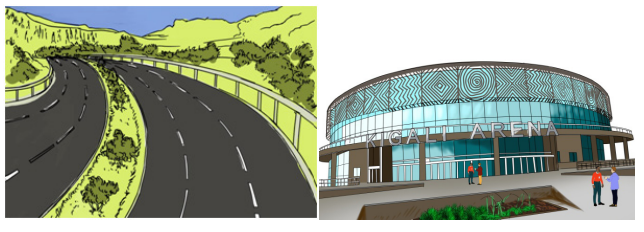
to almost every part of the country. There is a large population and there are
many vehicles to transport people and goods. There are many hospitals and
schools with very good facilities. The buildings are big, tall and amazing to look
at. Most of the country’s administrative offices and head offices of government
departments and organizations are found here.It is also where we find the National Bank of Rwanda and head office of the
University of Rwanda. There are a number of industries where people are
employed.
The people looking for jobs are usually more than the available jobs. Others
are government workers and they are paid salaries. Incomes are higher but
things are more expensive than in the village. Many people have piped clean
water supplied to their houses and electricity. Shopping is made easy by the
numerous supermarkets and shops found all over the city. There are also
various entertainment centres. People often travel using their own vehicles orthey use public transport such as buses or taxis.
Nadia is one the students studying at one of the schools located in my community.
She always walks on foot with her friends. At this school, children are taught
traffic rules. They have to be careful when crossing the road. They should look
both ways before they cross. There are zebra crossings for pedestrians at the
main roads, but not everywhere. Some learners ride their bicycles to school. If
they are carrying their heavy bags on their backs, it sometimes causes some
problems. Some travel by bus or taxi. Others are brought to school by motorcar,
if their parents have cars. There are very few of them. Because the school is in
the city, there are many services available. The school has a tuck shop. There is
also a café, a small supermarket, a bank and a post office near the school. Thebus stop is right outside the school grounds and a taxi rank is nearby.
Finally, my community does not only have business activities but also social
activities where people meet every last week-end of the month during
Umuganda and other social events such as weddings and burial ceremoniesamong others.
Adopted from English for Rwandan Schools, Student Book S5 (REB)
Comprehension questions
1. Which type of community was the writer born in and brought up?
2. How would you describe life in the city? Why do you think there is a
large population in the city?
3. Explain what can make the countryside a better place to live in.
4. In your opinion, what may cause some problems to people living in
towns?
5. Compare and contrast life of the city against life in rural area.
6. What should children do when they want to cross the road?
7. Which activities does the school neighboring community do?
8. With examples, give reasons why it is important to participate incommunity works.
1.3.2 APPLICATION ACTIVITY

1.4 Recounting the past experience
Text: Princeton, Athlete (Football)
I have learned great many things from participating in varsity football. It has
changed my entire outlook on and attitude toward life. Before my freshman
year at high-school, I was shy, had low self-esteem and turned away from
seemingly impossible challenges. Football has altered all of these qualities. On
the first day of freshman practice, the team warmed up with a game of touch
football. The players were split up and the game began. However, during the
game, I noticed that I didn’t run as hard as I could, nor did I try to evade mydefender and get open.
The fact of the matter is that I really did not want to be thrown the ball. I didn’t
want to be the one at fault if I dropped the ball and the play didn’t succeed. I
did not want the responsibility of helping the team because I was too afraid
of making a mistake. That aspect of my character led the first years of my
high school life. I refrained from asking questions in class, afraid, they might
be considered too stupid or dumb by my classmates. All the while, I went topractice and every day, I went home physically and mentally exhausted.
Yet my apprehension prevailed as I continued to fear getting put in the game
in case another player was injured. I was still afraid of making mistakes and
getting blamed by screaming coaches and angry teammates. Sometimes these
fears came true. During my sophomore season, my position at backup guard
led me to play in the varsity games on many occasions. On such occasions, I
often made mistakes. Most of the time the mistakes were not significant; they
rarely changed the outcome of a play. Yet I received a thorough verbal lashing at
practice for the mistakes I had made.
These occurrences only compounded my fears of playing. However, I did
not always make mistakes. Sometimes I made great plays, for which I was
congratulated. Now, as I dawn on my senior year of football and am faced with
two starting positions, I feel like a changed person.
Over the years, playing football has taught me what it takes to succeed. From
months of tough practices, I have gained a hard work ethic. From my coaches
and fellow teammates, I have learned to work well with others in a group, as
it is necessary to cooperate with teammates on the playing field. But most
important, I have also gained self-confidence. If I fail, it doesn’t matter if
they mock or ridicule me; I’ll just try again and do it better. I realize that it is
necessary to risk failure in order to gain success. The coaches have always said
before games that nothing is impossible; I know that now. Now, I welcome the
challenge. Whether I succeed or fail is irrelevant; it is only important that I havetried and tested myself.
Adapted from: https://www.infoplease.com/us/college-bound/sample-essays significant-experience
Comprehension questions
1. How would you describe the character of the writer when he/she was in
high school?
2. Why could the writer fail to get responsibilities?
3. Evaluate what made the writer who he/she is as discussed in the passage.4. Which lesson did the writer learn to gain success in life?
1.4.2 APPLICATION ACTIVITY
1.5 Language structure: Present simple tense, possessive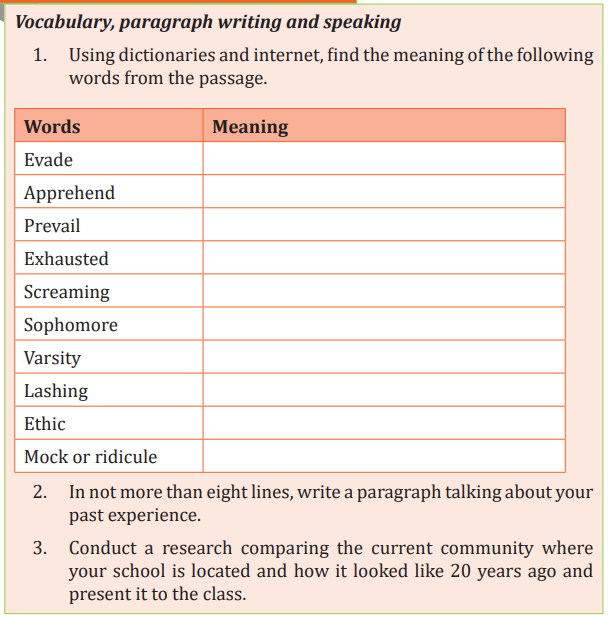
adjectives, and reflexive pronouns
Notes:
I. The present simple tense
The present simple tense is the most basic tense in the English language. There
are 7 uses of this tense in direct speech:
a. Facts, generalizations and universal truths.
b. Habits and routines.
c. Permanent situations.
d. Events that are certain to happen.
e. Arrangements that we can’t change (timetables, official meetings).
f. State verbs (be, have, suppose, know etc.)g. Narrations, instructions or commentaries.
A. Facts, generalizations and universal truths
The present simple tense is used when talking about universal truths such
as laws of nature or things we believe are, or are not, true. It’s also used to
generalize about something or somebody.
Examples:
• Water boils at 100 degrees Celsius. Universal( Truth)
• It is a big house. (Fact)
• The Earth goes around the Sun. (Universal truth, fact)
• Dogs are better than cats. (Generalization)
• Berlin is the capital city of Germany. (Fact)
• The Elephant doesn’t fly. (Fact)
• London is the capital city of France. (Fact)
• Kivu lake is located in the west of Rwanda.(fact)
B. Habits and routines
We also use this tense to describe actions that happen frequently. For example:
habits, routines, tendencies.
Examples:
• We leave for work at 7:30 AM every morning. (Routine)
• My husband watches the TV in the evening. (Habit, Routine)
• Susan often meets with her friends after school. (Habit, Routine)
• They usually play football on Sunday. (Habit, Routine)
• Mark rarely visits his sick grandmother.(Tendency)
• James usually tells lies. (Tendency)
• Every last Saturday of the month people in Rwanda get together toperform a type of community work known as “Umuganda”.(Routine)
Adverbs of FrequencyThe Present Simple is often used with frequency adverbs including the following:
Here are a few examples on how to use these frequency adverbs in sentences:
• I always go to church on Sundays.
• I never eat anything after 10 PM.
C. Permanent situations
The present simple tense applies for actions that last a relatively long time.
Examples:
• I live in Musanze district.
• He works as a receptionist.
• Margaret drives a Volkswagen.
• Jane teaches Mathematics at high school.
• Summer follows Spring,
• The best time to come to Kivu beach is in the evening to see the sunset
D. Events certain to happen
The present simple tense is also used when an event is certain to happen in the
future.
Examples:
• My grandmother turns 100 years old this July.
• Winter starts on 21 December.
• The concert begins at 7.30 next Friday evening.
E. State Verbs
Some verbs such as like, love... are called “state verbs” when they refer to “states.
A state action has neither beginning nor ending. It can’t be controlled and that’s
why it’s not normally expressed in present progressive tense.
Examples:
• I like swimming.
• We know this man.
• She loves her baby more than anything.
N.B. Some of the state verbs used in the present simple tense can also appear
in the present continuous tense. This is typically when they have an active
meaning or when they emphasize change.
Examples:
• I’m thinking of moving to San Francisco.
• I start loving your new haircut!
There are five groups of state verbs. They refer to: (1) feelings (like, love, etc);
(2) thoughts/belief (think, understand, etc); (3) wants (want, prefer, etc); (4)
perception (see, hear, etc); (5) being/having/owning (appear, seem, belong,
etc).
F. Future Arrangements
The present simple tense is used when talking about events whose schedule
can’t be changed (for example, an official meeting or a train departure).
Examples:
• The meeting starts at 4 PM.
• The train leaves at noon.
• First you weigh the ingredients.
Exercises
1. Write a paragraph about daily habits in your community with adverbs
of frequency.
2. Read the following extract and answer the question that follow
My sister Carol and I are very different. I really like sport, especially football,
but she doesn’t like it at all. Carol never eats meat but I eat it all the time. She
gets up early but I usually get up at about eleven. She loves classical music, and
I hate it! But we both use internet a lot- she sends me e-mails every day and we
both like dance music.
Identify the tenses used in the above extract and give a reason why it was
used.
3. Choose the correct alternative from the brackets to complete the
following sentences
a. (My friend/I)____________always sleep last.
b. You/John)___________teaches geography in all classes.
c. __________make a lot of noise when left alone(children/ that child)
d. Kevin and Suzan _____________well. (sing/sings)
e. Every child ____________a good education. (deserves/deserve)
f. In my community, we always ____________Social community.(practice/
practices)
4. Write ten sentences about the activities taking place in community using
present simple tense.
5. 5. Write a paragraph talking about your roles in community development
using present simple tense.
II. Possessive adjectives
1. Read the information about Thomas’ family and answer the questions.
2. Definition of adjective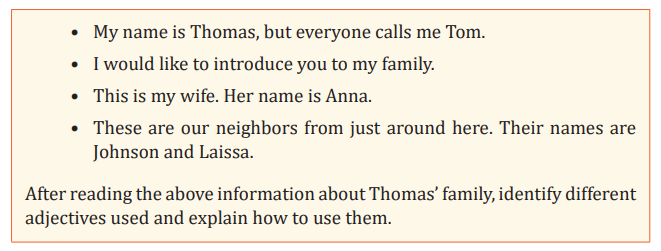
Adjectives are words that describe nouns or pronouns. Adjectives tell which
(this book, my book), how many (six communities), or what kind (red roses.
Possessive adjectives are used to show possession or ownership of something.
While we use them when we refer to people, it is more in the sense of relationship
than ownership.
Examples:
I love my community.
Our house is big and has a pool.
Their village is always clean and safe.
3. List of possessive adjectives
They include: my, your, his, her, its, our, your, their. They modify the nouns they
precede to show possession.
Examples:
• I’ll get my bag.
• Is this your luggage?
Exercises
I. Fill in blank spaces with appropriate possessive adjectives:
1) Joshua is looking for something. Where is --------- book?
2) Ruth, this is mine. Where is ------------- bag?
3) She goes to school alone. Why can’t she be escorted by ----------- brother?
4) Frank works as a teacher, what about ----- father?
5) You really like borrowing Mary’s property. Please be using...........own car
and leave alone .........laptop as well.
6) We like sports very much. ---------- favorite hobby is tennis.
7) She loves --------- husband so much. I wish I could do the same with
...........!
8) We want to see the match. We might come to watch it from ------------house.
9) Leila likes this dog, she is right......eyes look innocent!
10) What’s the name of ------------dog? My dog is called Bobby.
II. Write a paragraph describing your school community. Remember to use
possessive adjectives.III. Reflexive pronouns

Notes
The reflexive pronoun is used to refer back to the subject of a sentence. In this
case the “doer” and the “recipient” of the action are one and the same person.
Common examples of reflexive pronouns are myself, yourself, herself, himself,
itself, ourselves, yourselves, and themselves.It is formed by adding –self or –selves to personal pronouns.
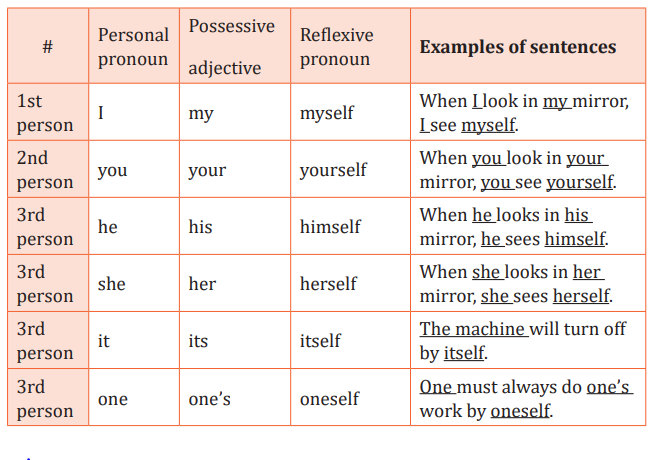
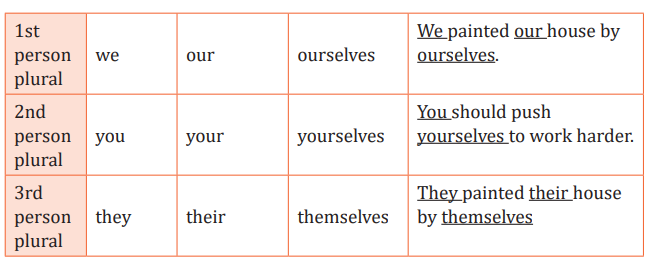
Reflexive pronouns are often used to:
1. Replace objects when the subject and object are the same person.
Example: I have really told myself not to worry about my community problems.
They are commonly used as object of verbs like burn, hurt, cut, enjoy, teach,
introduce, and look at. There are also common phrases with reflexive pronouns,
such as enjoy yourself (have a good time), help yourself (take something if you
want), and behave yourself (be good)).
2. Emphasise that a specific person is being referred to and nobody else.
Examples: I planned this workshop myself.
3. Express emphasis (as intensive pronouns).
Example:
I did homework myself. (Emphasizes the fact that nobody else helped me to do
my homework)
ExerciseWrite ten sentences using reflexive pronouns.
1.6 Spelling and pronunciation of 3rd person verbs inpresent simple tense
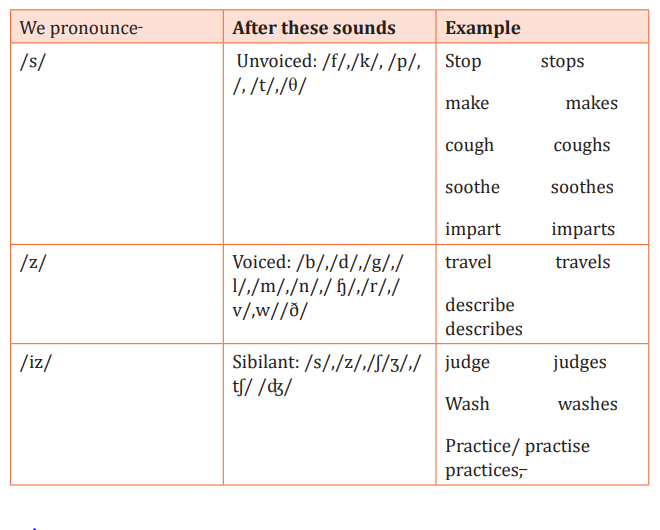
1.7 END UNIT ASSESSMENT
1. Use appropriate possessive adjectives and fill in the blanks below to
complete the sentences.
i. Where is _______ classroom? We can’t find it.
ii. Susan, is that _______ pen on the table?
iii. A: What is _______ name? B: My name is Thomas.
iv. I think this is _______ book. She dropped it on the floor.
v. _______ names are Kevin and Stewart. They are my friends.
vi. He forgot to write _______ name on the test!
vii. A: What is your phone number? B: _______ phone number is 555-
9826.
viii. Did the cat eat all of _______ food?
ix. The children are crying because they can’t find _______ toys.
x. Miriam and Jennifer like _______ new teacher.
xi. I really like my new home, especially _______ location.
xii. This is a picture of my friend. He is _______ best friend.
xiii. Do you think your father likes _______birthday present?
xiv. We still have twenty more minutes before _______ class begins.
xv. Brazil is located in South America. _______ capital city is Rio de
Janeiro.
xvi. When did Mr. and Mrs. Smith buy _______ new television?
xvii. Oh no! I can’t find _______ keys! Where are they?
xviii. A: Where is _______ brother? B: My brother is at school.
2. Complete each of the sentences below using appropriate reflexive
pronouns.
a. My brother likes to practice his English by talking to_________________.
b. James wasn’t careful and he cut ______________________ with a knife.
c. My sister and I looked at ______________________ in the mirror.
d. The repair shop was closed, so I fixed the car ______________________.
e. Did you enjoy ___________________________ at the party last night?
f. Cats can get clean by licking ___________________________.
g. (A) Did the cleaners clean the house? (B) No, I did it ______________________!
h. Mr. Smith burned ______________________ while he was cooking.
i. He dried out ______________________ after he had taken a shower and went
downstairs.
j. Can you teach ______________________ to play the piano?
k. My little sister dressed ___________________________. She didn’t need any
help.
l. Why is your dog scratching ______________________? Does it have fleas?
m.John and Thomas, did you ask ______________________ the question?
n. Mrs. Brown, please help ______________________ to the cookies and drinks.
o. I introduced ______________________ to my new classmates.
3. Complete these sentences using the verbs in brackets. Put the verbs in the
right tense.
a. Peter and his friends __________ to school by bus every day. (go)
b. Elephants __________ leaves and grass. (eat)
c. David’s father __________ in a hospital. (work)
d. The bank opens at 9.30 and __________ at 4.30. (close)
e. Tom and Jim always __________ football after school. (play)
f. Mr. Jones is a teacher. He __________ History. (teach)
g. Our lessons __________ at 9.00 and __________ at 3.30. (start / finish)
h. Mary and her brother __________ cartoons every Sunday morning.
(watch).
i. John __________ his room every day. (tidy)
4. Choose the right word from the bracket to complete the sentence
a. Franc always asks __________why English is used as a language of
instruction in our society. (Itself, himself)
b. I consider ___________________to be an intelligent person in my community.
(yourself, myself)
c. The computer will reboot _________after the program installation.
(himself, itself)
d. George and Daniel drive _______to work every day. They don’t take the
bus.(themselves, ourselves, )
e. Sarah cleans her room by ________. She never asks for help.(myself,
herself)
f. It is exciting for one to see _______on television.(itself, oneself )
5. Write a 200 word composition describing one’s community activities and
people’s contribution in its development. Pay attention to the use of presentsimple tense, possessive adjectives and reflexive pronouns.
